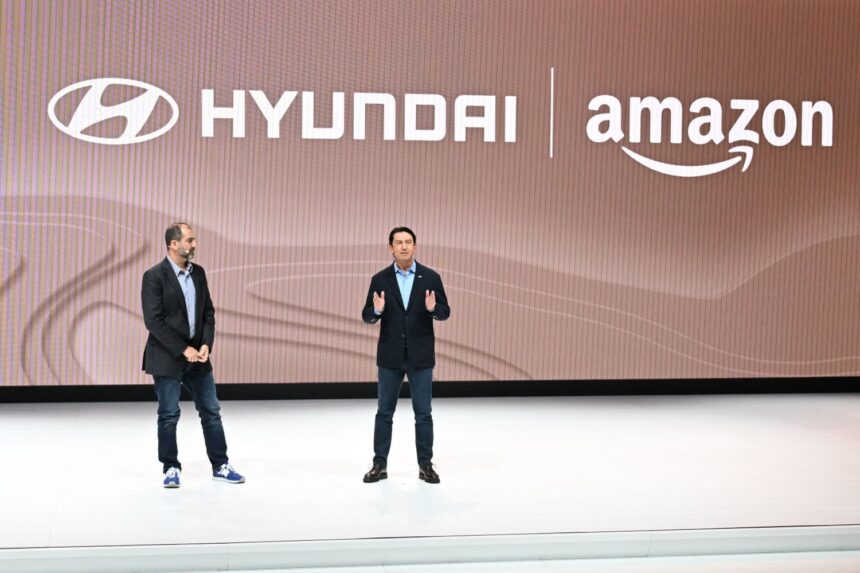Somewhere at Carvana headquarters, executives are huddled and watching the water rippling in the glasses of water on their boardroom table like it’s Jurassic Park because the T. rex of the online retail world announced this morning that it is getting into the car-selling business. Amazon announced that it will be partnering with Hyundai to sell vehicles directly to consumers online.
As of today, car shoppers in 48 U.S. cities will be able to browse vehicles in stock at local participating retailers directly on Amazon as part of the Amazon Autos program. According to the company, potential car buyers will be able to search for cars based on make, model, trim, color, and features, and will be able shown “transparent, upfront pricing” for their potential purchase. Buyers will also get an instant trade-in evaluation for their current car, generated by an “independent third party,” which can be applied directly to the cost of their new ride. Amazon will offer financing options or the ability to pay in full upfront, and buyers will schedule a pick-up time at their local dealer.
The participating cities for the initial launch includes: Atlanta, Austin, Baltimore, Beaumont-Port Arthur, Birmingham, Boston, Champaign/Springfield, Charlotte, Chicago, Cincinnati, Cleveland, Columbia, Columbus, Dallas, Denver, El Paso, Fond Du Lac, Ft. Myers/Naples, Harrisburg-Lancaster-Lebanon-York, Harrisonburg, Hartford, Houston, Indianapolis, Jacksonville, Los Angeles, Miami, Milwaukee, Minneapolis-St. Paul, Nashville, New York, Orlando, Philadelphia, Phoenix, Pittsburgh, Portland, Providence, Raleigh-Durham, Salt Lake City, San Antonio, San Diego, San Francisco, Seattle, Sheboygan, Springfield, St. Louis, Tampa, W. Palm Beach, Washington D.C.
Amazon said it plans to expand its offerings to other regions next year. And while it’s starting with Hyundai, the company said it will branch into other manufacturers in the future. Thus far, the service is only available for new vehicles. Amazon did not offer any word on whether it intends to expand into the used car market in the future—though it stands to reason that the company would eventually dip its toes into that space, too.
The partnership between Amazon and Hyundai dealers does have a bit of a no-brainer appeal for both parties. For Hynduai dealerships, it gives them the ability to both reach a wider audience of shoppers through the ubiquity of Amazon and not have the same pressure of maintaining its own online platform and inventory.
Plus, let’s be real, there has never been a good car dealership website. Increasingly, people want more of the car buying process to occur online—69% of shoppers say they want to conduct more of the buying process from home, per research from CarGurus. And yet, most car dealership sites make the experience harder rather than easier. A study conducted on top car dealership websites found most fail basic website performance standards, and research from ShiftDigital showed many of these sites are rife with language and calls to action that turn off shoppers.
As for Amazon, this dealership arrangement allows it to get into some big-ticket sales without needing to create storage space for inventory or deal with the actual logistics of shipping.
And car financing is big business. Americans currently owe a collective $1.626 trillion to auto lenders, according to the Federal Reserve Bank of New York. Much of that is tied up in subprime loans, which auto dealers are notorious for pushing car buyers into, resulting in consumers paying significantly more than they need to. Most car loans made through a dealership are actually financed by a partnering bank or financial institution, but it’s common for dealerships to tack an additional 1-2% onto the interest rate to cash in on a captive buyer.
Per the Amazon Auto help pages, financing will be handled by the dealership for now, with Amazon acting as the middleman for the transaction, so the company offers no guarantees for available annual percentage rates (APR) on the loans.
While online car sales is a complicated business—so complicated that it has actually slowed Amazon’s intended expansion into the space—Amazon might do well simply by minimizing the direct involvement of car dealerships. Nearly everyone finds dealing with car dealers unpleasant, and Amazon’s platform is so familiar to shoppers at this point that it might ease some of the pain points of the process. On the flip side, it’s going to be so annoying when you buy a roll of paper towels and Amazon hits you with “People who bought this also bought a Hyundai Elantra.”
Read the full article here












